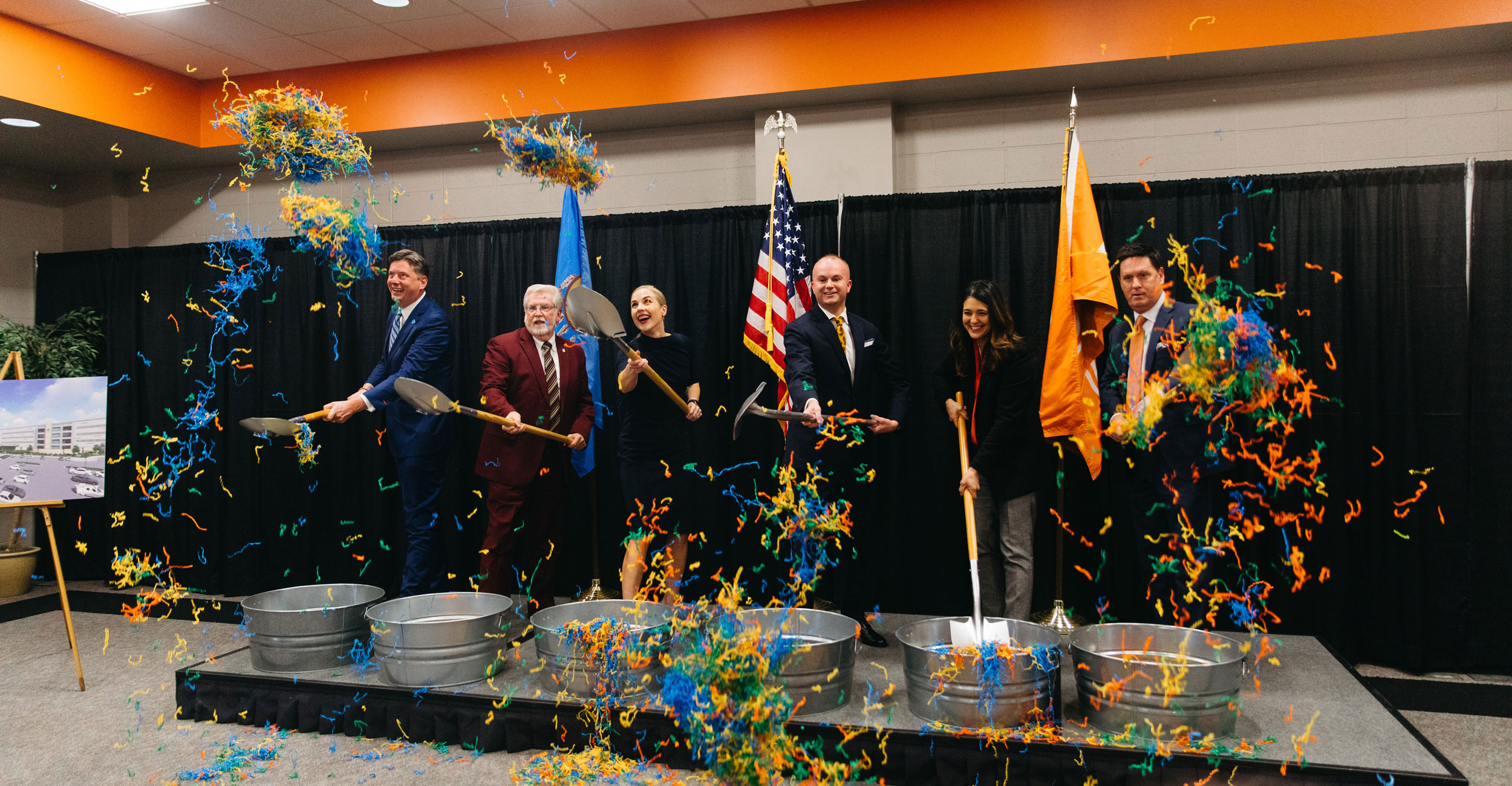
OKC mental health hospital groundbreaking marks milestone for advancing care
Thursday, March 28, 2024
Media Contact: Jack Damrill | OSU-OKC Sr. Director of Marketing & Communications | 405-945-9198 | jack.damrill@okstate.edu
The Oklahoma Department of Mental Health and Substance Abuse Services partnered with Oklahoma State University on Thursday to celebrate a ceremonial groundbreaking for the new Donahue Behavioral Health facility.
Announced in September 2023, this 200,000-square-foot behavioral health facility on the OSU-OKC campus will replace the Griffin Memorial Hospital in Norman, Oklahoma, which has been the state’s primary mental health hospital for over a century.
“It's a great day to celebrate an important milestone in improving access to quality health care for those struggling with mental illness,” said Kyle Wray, OSU senior vice president of system affairs. “OSU takes to heart our land-grant mission, which calls us to use our talents and our resources to help our great state solve its most pressing challenges and help Oklahomans live healthy and productive lives.”
Donahue Behavioral Health will offer an array of innovative services that Oklahomans rely on during their most vulnerable moments. The facility will offer care for adults and adolescents, as well as referrals to outpatient services.
“The Donohue Behavioral Health facility is another critical step in addressing the mental health needs of our community and throughout Oklahoma,” U.S. Congresswoman Stephanie Bice said. “This is an investment that will continue to expand on the One Health goals of Oklahoma State University, which seeks to increase the quality of research and care through all fields of medicine.”
Equipped with the latest in acute care capabilities, the hospital will expand ODMHSAS’ psychiatric bed capacity and operational reach. The inclusion of an Urgent Recovery Center (URC) will ensure immediate access to vital services, providing walk-in availability to stabilization services.
“Not only is this going to expand access to behavioral health and health care, but it's going to do so in a way that promotes excellence,” ODMHSAS Commissioner Allie Friesen said. “This incredibly beautiful building is going to exude excellence, and that is exactly what we will provide inside of its walls.”
Last year, OSU broke ground on the 106-bed, $70 million Oklahoma Psychiatric Care Center in Tulsa, which will open in the next year.
“When these two facilities are completed, they will catapult Oklahoma into the national spotlight for the way we are addressing and meeting the health care needs of our citizens,” Wray said.
The new Oklahoma City facility is expected to add about 250 jobs to the local economy. The five-year economic impact of the new hospital on the OKC metro is estimated at $447.5 million, with improvements in job creation and taxes, as well as reducing emergency room costs and homelessness.
“For the first 130 years of our city's history, we never put anything into mental health services at the city level,” Oklahoma City Mayor David Holt said. “When we were developing MAPS in 2018 and 2019, we asked our residents what they wanted to see in MAPS. I think for a lot of people, it surprised them that one of the top four things was mental health.
“... We are a metro of 1.5 million people and a city of 700,000. We need these services, and we need a hospital like this.”
The Donahue campus was selected based on ease of access, community support and the opportunity to draw upon broader workforce development partnerships and support resources. The hospital creates the opportunity to explore collaborative health programming opportunities with the school.
The facility is named after Dr. Hayden Donahue, who became Oklahoma’s first director of mental health in 1953. A former OSU professor, Donahue was named to the Oklahoma Hall of Fame in 1968.
“By removing stigma and shame, and by giving so many the chance for a normal life, he created a better and brighter future for all,” said Cullen Sweeney, Donahue’s grandson. “The lesson in the legacy of Hayden Donohue, I believe, is that world class care is possible in Oklahoma. Our problems are not insurmountable when we effectively and efficiently harness the resources of state government, along with public and private partners to serve the common good.”
More than $150 million has been invested in the facility. The Oklahoma Legislature provided $87 million in American Rescue Plan Act money to fund hospital construction. In addition, Oklahoma County Commissioners approved $1.5 million in ARPA funds for relocation, and the City of Oklahoma City and several metro philanthropic organizations have pledged their support. ODMHSAS will also contribute to the hospital's costs through the sale of property in Norman.
To receive ARPA funding, the Oklahoma Legislature stipulated the new facility must be located within 30 miles of the Capitol. That opportunity allowed ODMHSAS to explore sites outside of Norman, and soon after drew interest from nearby civic leaders.
“Today in Oklahoma, we're standing tall and we're saying you matter to us,” said state Sen. Roger Thompson from Okemah. “We want you to have the same quality of life we have. We want you to have the same medical care that we have. And from this day forward in Oklahoma, mental health will be at the forefront of everything that we say and do because we love the people of Oklahoma.”
The hospital was also made possible in part thanks to the Oklahoma City Community Foundation, Kirkpatrick Family Fund and Arnall Family Foundation.
“In the words of Dr. Hayden Donohue, ‘Together, we can create a world where every person feels seen, heard and supported,’” Friesen said.
